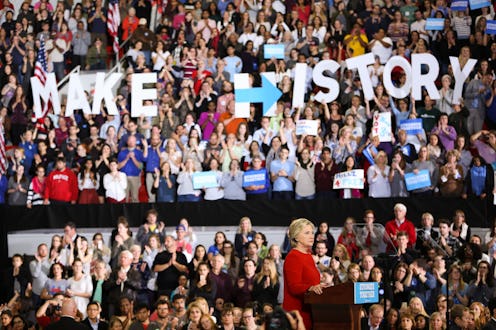News
People Have A Last-Ditch Effort To Stop Trump
Thousands protested in multiple cities in the United States the weekend after Donald Trump's presidential victory — a sign of the widespread discontent much of the country is feeling. While some of his opponents are considering moving to Canada and others have resigned themselves to continue fighting for their values within Trump's America, there is still one group determined to stop Trump and take Hillary Clinton to the White House by encouraging members of the Electoral College in swing states to vote for the Democrat on Dec. 19.
One of the many reasonings behind the effort to sway this year's electors is the split between the popular vote and the Electoral College: One can argue that the people spoke and they want Clinton. She currently leads Trump by roughly 668,000 votes, a figure that is expected to grow. If she maintains her lead in the popular vote, the argument that America should put Clinton in the White House is a compelling one.
Ironically, the reason the founding fathers established the Electoral College was to ensure that, should the general population choose a reckless candidate to lead the country, a smaller group of people with a higher sense of judgment and reasoning skills could step in and choose the wiser selection. Alexander Hamilton wrote the following in the Federalist Papers:
It was equally desirable, that the immediate election should be made by men most capable of analyzing the qualities adapted to the station, and acting under circumstances favorable to deliberation, and to a judicious combination of all the reasons and inducements which were proper to govern their choice. A small number of persons, selected by their fellow-citizens from the general mass, will be most likely to possess the information and discernment requisite to such complicated investigations. It was also peculiarly desirable to afford as little opportunity as possible to tumult and disorder.
In this case, the popular vote went with the candidate most people, including those outside of the United States, see as being better qualified and possessing a more reliable temperament. The announcement of Trump's victory caused an initial panic across global financial markets, and world leaders do not trust him. He has been caught lying often. His knowledge of foreign affairs is extremely limited. His favorability ratings among most Americans are abysmal — yes, even more abysmal than Clinton's ratings.
If the Electoral College were to function according to its original purpose of preventing unfit candidates from taking office, it would be very difficult to argue for Trump's suitability, when compared to Clinton's decades in government, working from the local, state, national, and international levels. Trump's work experience is limited to his businesses and to reality television.
If you'd like to spread the word about this effort to save Clinton's would-be presidency, you could start by promoting the Change.org petition on your social media accounts. Another vital way to get this moving is to contact activist groups and pro-Clinton groups and encourage them to use their platforms promote the message. Ask them to mobilize their volunteers. And of course, don't forget to participate yourself in addition to spreading the word.
Now, if you do plan on reaching out to this year's electors, be prepared for a very tough task. Each candidate nominates their own list of electors, and only the winner's picks in each state vote in December, meaning all of the people you would contact are going to be loyal Republicans. Convincing dozens of Republican Party members to vote for a Clinton is definitely an extremely rough challenge, but if you're determined to try everything to change this election result, this is the one remaining concrete way to do it.
